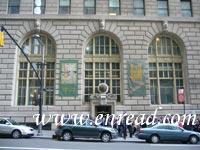| ||||||||||||||||||||||||||||||||||||||||||||||||||||||||||||||||||||||||
|
A file photo of the Museum of American Finance.The global economic crisis wears on, but the Museum of American Finance is already documenting its history in an exhibit that opened on Wednesday. The global economic crisis wears on, but the Museum of American Finance is already documenting its history in an exhibit that opened on Wednesday. Tracking the Credit Crisis provides a timeline of the events that led to the current recession and translates the catchphrases of the economic downturn such as "securitization", "liquidity1", and "derivative2" for the average person. "We're now entering what may well be the most challenging man-made calamity3 in modern experience, a global financial crisis of unprecedented4 size, speed, interconnectedness and complexity," said Lee Kjelleren, the chief executive of the museum, who said he hoped the exhibit would help the public understand events as they unfold. The exhibit records events on Wall Street from February 2007 to February 2009 highlighting everything from the announcement by "The Concise5 Oxford6 Dictionary" that it would include the terms "subprime" and "credit crunch7" in its next edition to Lehman Brothers' bankruptcy8 on September 15, 2008. The last date on the timeline is March 2, 2009, when American International Group (AIG) Inc announced a loss of $60 billion in the fourth quarter of 2008, the largest loss in US corporate9 history. The museum has not yet caught up with AIG's controversial bonuses. "You cannot really document history until well after the fact," acknowledges Leena Akhtar, who co-curated the exhibit at the museum just steps away from the New York Stock Exchange. The museum says its mission is to reaffirm the power of an open, democratic, free-market economy, but this exhibit explores some of the failures that led to the current crisis. The emphasis on big bonuses at American financial institutions and expectations for bank bailouts were partly responsible for the current crisis, Kjelleren said. 全球经济危机余波未平,而美国金融博物馆已经开办展览记录这段历史。这一展览于上周三开始。 这一名为“信贷危机回顾”的展览介绍了导致目前经济衰退的一系列事件的发生时间表,并向人们阐释了经济衰退时期的一些流行语,如securitization(证券化),liquidity(流动性)和derivative(衍生品)等等。 博物馆首席执行官Lee Kjelleren说:“目前我们正经历现代历史上最具挑战的一场人为灾难。这场全球金融危机的规模、速度、关联度和复杂性是前所未有的。” Lee Kjelleren说他希望这次展览能帮助人们了解事件发生的经过。 这次展览记录了从2007年2月至今年2月华尔街发生的一系列大事,从《牛津简明词典》宣布将在其下一版中收录subprime(次贷)和credit crunch(信贷紧缩)等词语到去年9月15日雷曼兄弟破产等应有尽有。 时间表中最近的日期是2009年3月2日,这一天美国国际集团(AIG)宣布其去年第四季度亏损600亿美元,这是美国企业史上最大的亏损额。但博物馆还未将AIG颇具争议的“奖金门”事件包括在内。 负责此次展览的Leena Akhtar说:“你只有等一件事尘埃落定后才能真正记录它的历史。” 美国金融博物馆距纽约证券交易所仅有几步之遥。 该博物馆称,其使命就是肯定开放、民主和自由市场经济的力量,但这次展览却探索了导致目前这场危机的一些失败之处。 Kjelleren说,美国金融机构过分强调用巨额奖金(留住人才)以及对银行救援资金的依赖在一定程度上也要为目前这场经济危机负责。 Vocabulary: wear on:慢慢过去 点击  收听单词发音 收听单词发音
|
||||||||||||||||||||||||||||||||||||||||||||||||||||||||||||||||||||||||
- 发表评论
-
- 最新评论 进入详细评论页>>




